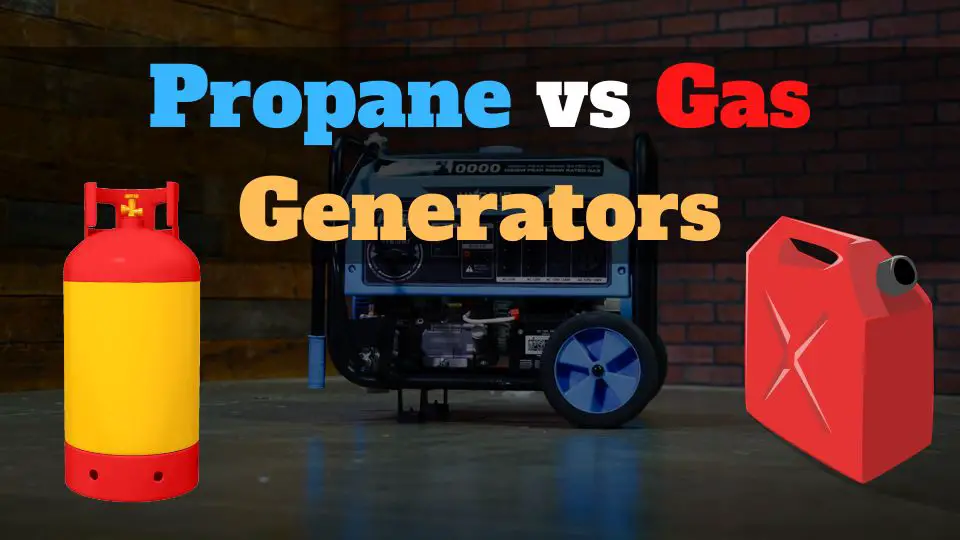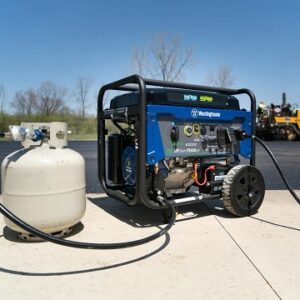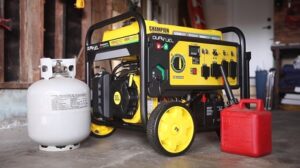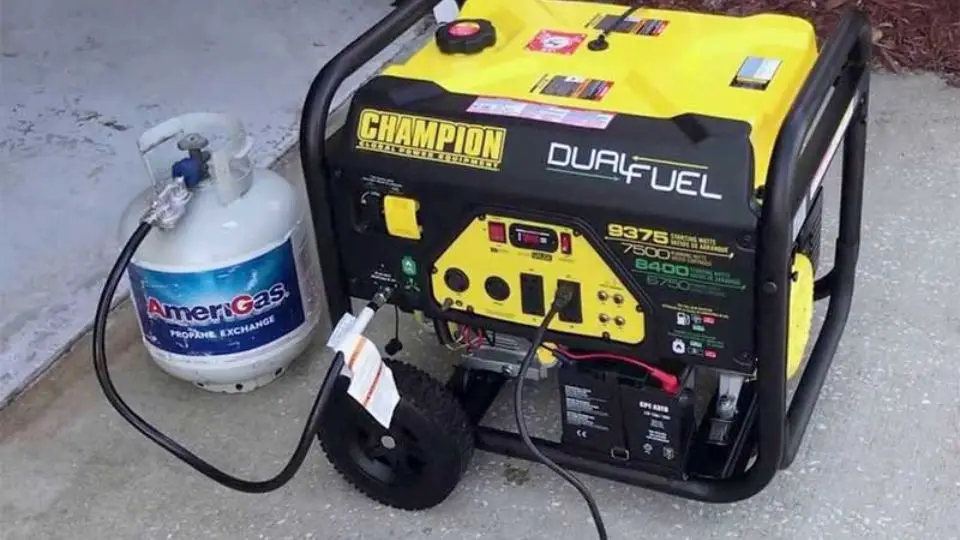This post may contain affiliate links. As an affiliate, we earn from qualifying purchases. We get commissions for purchases made through links in this post.
Propane and gas generators are useful to have around in the event of a power outage. You can use both of them to power your most important appliances, such as a fridge, a heat pump, or house lighting.
But, how do you choose between propane and gasoline generators? Which one is the best?
Propane generators are often used as standby units as they allow an extended continuous run due to fast refilling that comes down to just quickly stopping them, swapping the empty tank with another one, and starting them up again. With gas generators, you’d have to refill the tank from a canister, which takes some time.
A gasoline generator is more suitable for camping and RVing. Usually, you don’t want to carry a large propane tank to a campsite and you don’t need a generator running for days when camping. Besides that, a gasoline station is easier to find than one that provides an LPG. Of course, you can use a gas generator as a backup for your house if the outages are not frequent.
Advantages and disadvantages of propane generators
Propane generators are available in portable designs and whole-house standby designs (the latter are mostly dual-fuel that run on propane and natural gas). A portable propane generator hooks up to a propane tank of varying capacities. A larger standby generator connects to a huge outdoor propane tank, which is a common sight in rural areas.
Advantages
- run appliances for longer
- propane burns cleaner
- safer to operate
- runs quieter
- longer shelf life for propane (propane does not degrade when stored for a long time)
Disadvantages
- lower energy output (only around 73% of what gas will produce)
- reduced availability
- propane tanks are much heavier than gas canisters
- shorter engine life
Propane generators run a bit quieter than most of their gas counterparts. You will especially notice this if you install a conversion kit on a gas-powered generator and try running it on propane.
Propane also burns cleaner compared to gasoline, therefore having a much smaller environmental impact.
Propane also lasts longer in storage. You can store propane indefinitely. However, gasoline typically has a shelf life of about 12 months.
Gasoline is also more hazardous. It is highly toxic and flammable. It emits toxic fumes, which requires you to place a gas generator further from your home. While a propane generator may sit a few feet from the house, a gas generator should be at least 20 feet away.
However, be advised, propane consumption is higher than that of gas when producing electricity, so you will end up spending more fuel in the long run. Propane is still a bit more cost-effective than gas if it comes to storing it for a long time (you don’t have to use additives in propane).
You may also want to keep in mind that propane is not that widely available when compared to gas. Make sure the area where you live has nearby propane refill stations.
Engines that run on propane are considered to have a shorter life. While this downside is exaggerated by many online resources, this is still good to keep in mind.
Advantages and disadvantages of gas generators
While propane generators offer many advantages, gas generators also have their uses.
Benefits
- more portable
- fuel is readily available
- more affordable
- higher energy output
- cost less
- no need for heavy tanks
- less complex mechanism
Drawbacks
- noisier
- make a bigger environmental footprint
- gasoline degrades in time and requires stabilizers
- carbon deposits need to be cleaned from time to time
- gasoline is susceptible to leaking and produces flammable fumes
Gas generators are portable and versatile. You do not need to connect them to a propane tank, and they run on gasoline, which allows you to take them almost anywhere.
You will always get a higher energy output from a gas generator when compared to a propane one.
Gas generators may make more sense for those who only need them for a rare emergency. They are easy to use and often more affordable compared to propane-powered generators.
The engine and exhaust of a gas-powered generator require timely cleaning due to carbon deposits left by gasoline.
Gasoline degrades with time. If you want to store it for weeks, be ready to spend money on fuel additives that will allow prolonging its expiration date.
One important disadvantage of gas generators compared to propane ones is that they create more noise. If you still want to use a gas generator, consider inverter models as they run much quieter compared to ordinary ones.
Propane vs gasoline generator. Which should you choose?
A gas generator will work best if you’re going to use it occasionally for a few hours per day in your household or if you’re going to do camping, especially if you have an RV and want to run an aircon in it.
A gas generator is a perfect choice if you want to run a power tool without access to a house power outlet or even run a welder for small to medium-sized projects. A gas generator is easy to carry around and it can produce enough power for most tasks given that you do not have to run it for days.
A propane generator is the best option if you want to use it as a backup for your household. In most cases, you will want to run the propane generator as a stationary solution or rarely move it.
If you need a generator to run for days in one place like your household, the propane one would be your best bet. Make sure to have a stockpile of pre-filled propane tanks in your storage or a huge propane tank that is installed outside. A propane generator is much more ecological and you will not suffer from the poisonous exhaust or smelly and toxic fumes that gasoline models will produce.
Is a propane generator better than gas?
A propane generator offers several advantages over a gas generator, including the ability to run longer and cleaner. Propane is considered a clean-burning fuel. However, gas generators are more portable.
Is a propane generator quieter than a gas generator?
A propane generator is typically quieter than a gas generator. Generator noise levels can vary from 50 decibels (dB) to 100 dB, depending on the size of the generator and the manufacturer. While both types of machines can be quite noisy, a propane generator is typically the quieter of the two.
Does a generator run longer on gas or propane?
A propane generator can run for longer, as it typically has a larger fuel supply. A gas generator is designed for temporary use and requires more frequent refueling. It also requires cleaning after using it for a while on gas as it leaves a residue inside the system.
Is it cheaper to run a generator on gas or propane?
On average, propane costs about 30% less compared to gasoline. However, propane generators are typically less efficient, as they produce fewer BTUs per gallon of fuel. Overall, a gas generator is slightly cheaper to run due to the increased generator efficiency of gasoline-powered units.
Is a dual-fuel generator worth it?
If you want to be flexible with how and where you use your generator, then your best bet is to go for a dual-fuel model. You can use this type of generator both as a standby unit as well as a portable power source for camping, construction work, welding projects, etc.
A dual-fuel generator offers freedom of which type of fuel you want to use. In case you have access to a huge supply of gas in your area and not enough propane re-filling stations – then you will run it on gas. Move to some other location where the propane supply is good and you can run your dual-fuel generator of a tank of LPG.
The only downside of dual-fuel generators is they are more expensive than standard propane-only or gas-only generators. Having said that, if you’re looking for a portable generator, finding one that runs only on propane is going to be hard.
Most portable generators are either gas-only or dual-fuel. If you already have a gas-powered generator and you want to replace it with a dual-fuel model, don’t be quick. You can always purchase and install an LPG conversion kit and turn your gas generator into a dual-fuel







2 thoughts on “Propane vs Gas Generators”
Comments are closed.